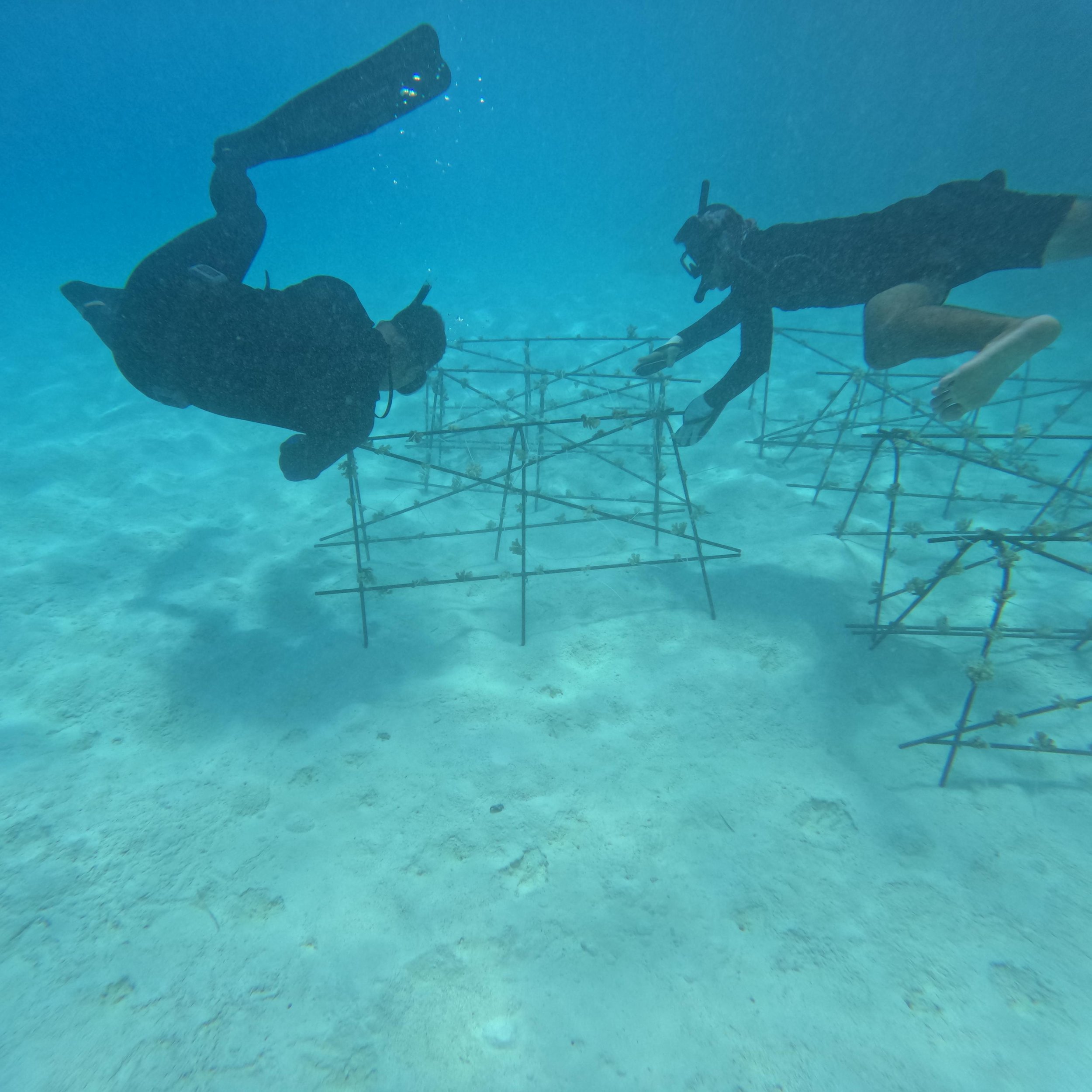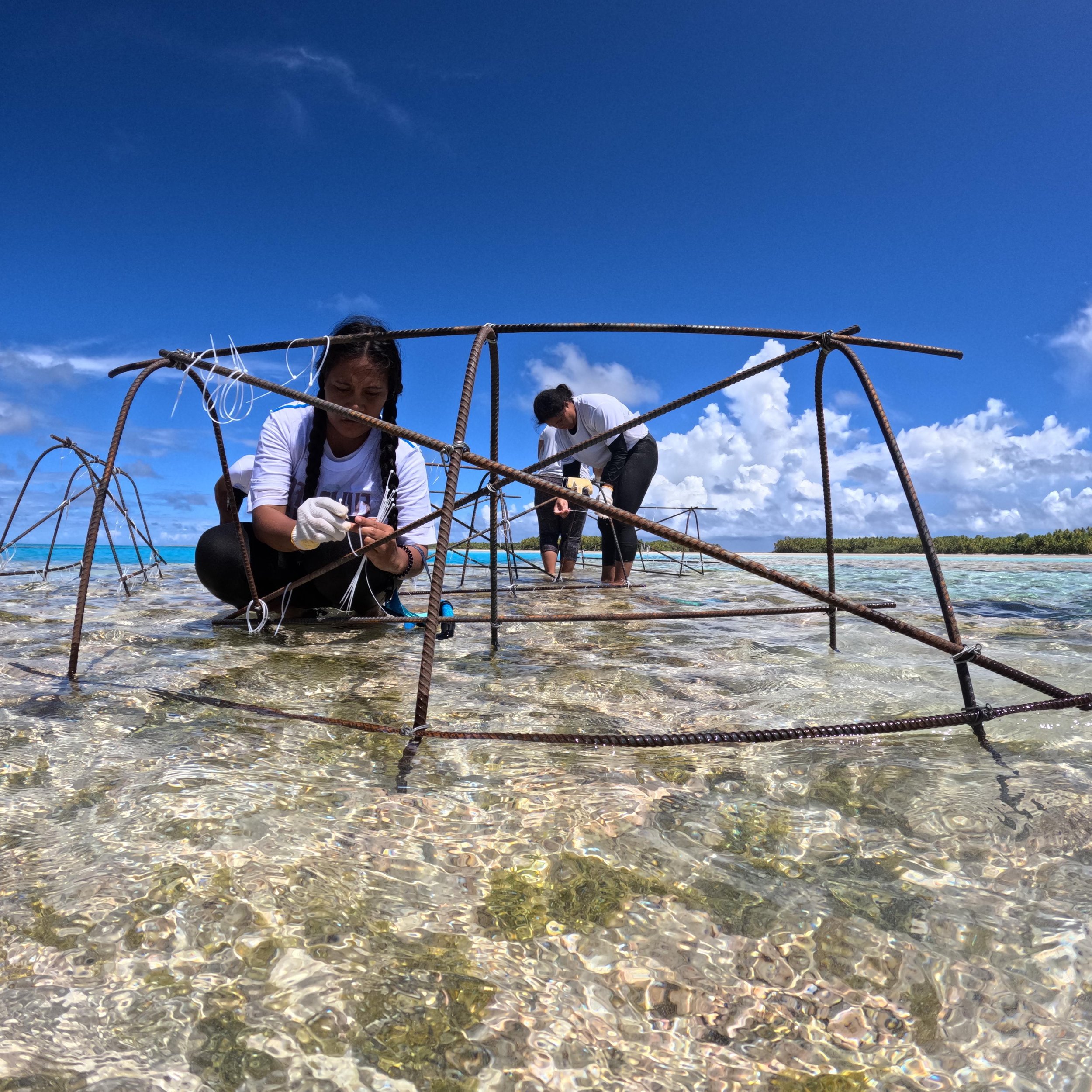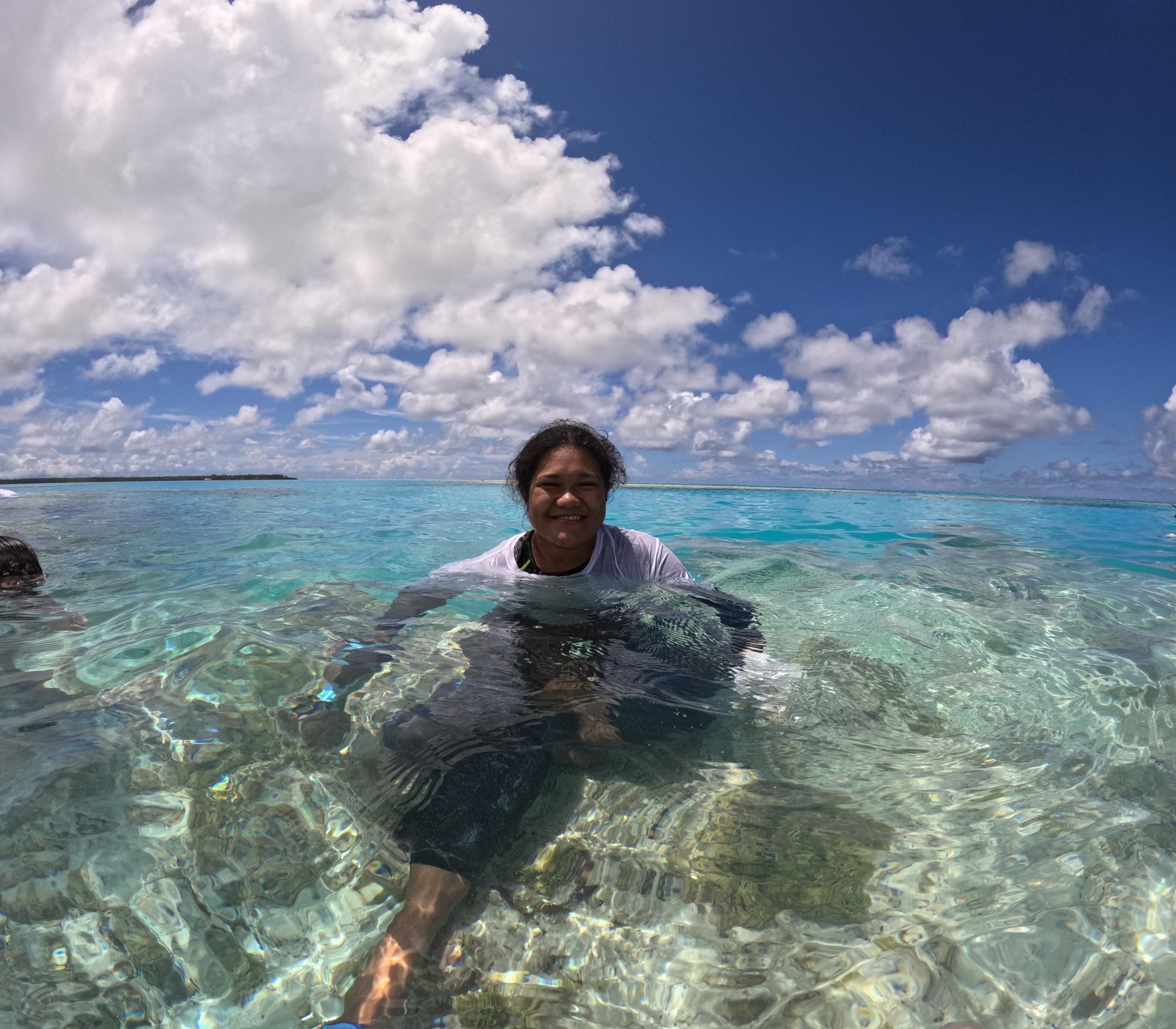Reef rebirth: fighting for Tuvalu’s corals
Coral transplanting is a multi-step process that involves the local community, to ensure a sustainable future for the reefs and the community. © UNDP Pacific.
Beneath the still blue Pacific Ocean, a threat is silently unraveling. Once-vibrant coral reefs teeming with fish life, are suffering the impacts of bleaching and sea temperature increases. Tuvalu’s three reef islands and six atolls are made of reef platforms, and they are increasingly threatened by the impacts of climate change including sea-level rise.
“I am from the beautiful island of Nui,” explains Talua Nivaga, youth activist and co-founder of the only environmental youth-led organization – Fuligafou, focusing on coral restoration initiatives. The NGO unites young people of all backgrounds through initiatives including coral restoration, women empowerment, and tree planting.
Working together with the Tuvalu Coastal Adaptation Project (TCAP), Nivaga and his colleagues will inform locally led coral restoration efforts as part of the project’s community engagement activities.
The initiative Fuligafou involves transplanting super corals to the damaged areas of the reef, where they can grow and help to rebuild the damaged areas. © UNDP Pacific.
Youth spearheading change
“When I was younger, I didn’t know what function corals played in the ocean and their significance. But now we work to raise awareness of the importance of coral restoration. We look at how we can preserve our ecosystems for the next generation.”
Nivaga and a team from Fuligafou went back to the island of Nui, to build a coral restoration nursery. At the time, only one coral species was left.
“We worked together with scientists on the Ridge to Reef project to ensure long-term sustainability and to save and preserve our corals. By transplanting corals to cooler pockets of water, Nivaga and his team made sure that the corals would survive and flourish. "We can’t afford to live on the island if corals are dead. Tuvalu is made up of coral islands and heavily dependent on fish,” he says.
He added that while in Tuvalu, as well as in many community and organizational settings, youth are often at the forefront of initiatives. “However, youth are often not recognized as collaborators, as protagonists of our own development, as spearheads of our communities, and as future leaders of our nation,” he noted. “Thus, we wanted to initiate Fuligafou youth-led organization, to ensure that youth are united with a shared vision of taking ownership of our own development to enhance the resilience of our communities,” he explains.
“Ensuring that youth are empowered and actively engaged and involved in our workshops is critical. We develop their understanding about the significant importance of corals and their capacity to protect them. Our strategy is also to engage youth in the coral planting work.”
Fuligafou member, Tealofa Teagai. © UNDP Pacific.
Conserving the reefs, preserving knowledge
“As humanity, we define shelter as very important to our survival. If our shelter is destroyed, we will migrate to find more comfortable conditions. Corals are the house of fish. If corals are bleached and destroyed, fish will migrate. With that migration, an extreme threat is posed to the community and people of Tuvalu who rely heavily on fish for income and as a source of protein.”
Sharing information with neighbors is also central to the culture of people on the island, to ensure everyone is safe and able to survive during periods of bad weather, he says. There is much local knowledge about the protection of fish around the island.
Indigenous methods of preserving fish stocks include ‘no-take’ areas where fish cannot be caught.
“This has to come from island communities who own their development,” he explains.
“In the old days, people would look at the sky and identify weather patterns in the next few days, to know when to catch more fish to stock up. Indigenous practices focus on coral restoration, and we work in parallel with communities to tap indigenous knowledge.”
The TCAP work has moved to the outer islands of Nanumaga and Nanumea. © UNDP/TCAP.
Money helps us move
As construction efforts like those implemented by TCAP are underway in Tuvalu to support communities in adapting to climate impacts, restoration efforts such as those put in place by Fuligafou are essential.
“Through TCAP, we have been engaged to plan and ensure all coral species can be transplanted to locations where they can survive,” says Nivaga. “Elevating the land so that we ensure that Tuvalu can thrive is important. This project ensures we have not only extra but higher land, because we don’t want to leave.”
As the 4th International Conference on Small Island Developing States approaches, Nivaga has this message: “There will never be another Tuvalu, we must preserve our culture and come together. We still have a chance. We still have an opportunity to exercise rights and come together as society and as an international community to save Tuvalu.”
“Let’s not lose hope but remain strong and steadfast. We will continue to fight for our beloved Tuvalu. To make a move, we need climate finance and to be able to address challenges as TCAP is doing, alongside the revival of traditional practices working in parallel for the benefit of all.
“Climate finance moves everything required to address climate adaptation, mitigation and other goals. We need to stop talking; we already have strategic plans, regional plans. My key message is: just do the work, act upon your words. The more we talk the more we prolong the process and risk everyone’s lives. Now is the time for progress and accountability.”
Nanumea atoll in Tuvalu, where new berm top barriers are being installed to prevent wave overtopping. © UNDP/TCAP.
TCAP is supported with thanks to the Green Climate Fund, alongside the Government of Tuvalu and Australia's Department of Foreign Affairs and Trade.
About the Tuvalu Coastal Adaptation Project
With US$36 million financing from the Green Climate Fund and US$2.9 million co-financing from the Government of Tuvalu, the 7-year Tuvalu Coastal Adaptation Project is contributing to strengthening the resilience of one of the world’s most vulnerable countries to climate change and sea-level rise. Implemented by the UN Development Programme in partnership with the Government, the project is improving coastal protection in key locations on the islands of Funafuti, Nanumea and Nanumaga. While new measures will act as a buffer during storms, the project also strives to build the capacity of national and island governments and local communities in adapting to climate change in the longer term. Learn more at TCAP.tv Follow the project on Twitter @TCAP4Tuvalu or on Facebook
About the United Nations Development Programme
UNDP is the leading United Nations organisation fighting to end the injustice of poverty, inequality, and climate change. Working with our broad network of experts and partners in 170 countries, we help nations to build integrated, lasting solutions for people and planet. Learn more at undp.org
About the Pacific Community (SPC)
The Pacific Community (SPC) is the principal scientific and technical organisation in the Pacific region, proudly supporting development since 1947. It is an international development organisation owned and governed by 27 country and territory members.
SPC is a key project partner to TCAP, undertaking Environmental and Social Impact, Geotechnical, Sea Level Measurement and Wave Inundation Assessments in support of TCAP’s work programme. SPC will also deliver a hands-on training programme for Tuvalu government officers and other interested parties in 2023. Among various subjects the training will cover use and improvement of the hazards dashboard.
Additional photos from the Tuvalu Coastal Adaptation Project also available on Flickr: https://flic.kr/s/aHsm6S2Zkw *Please credit as indicated




